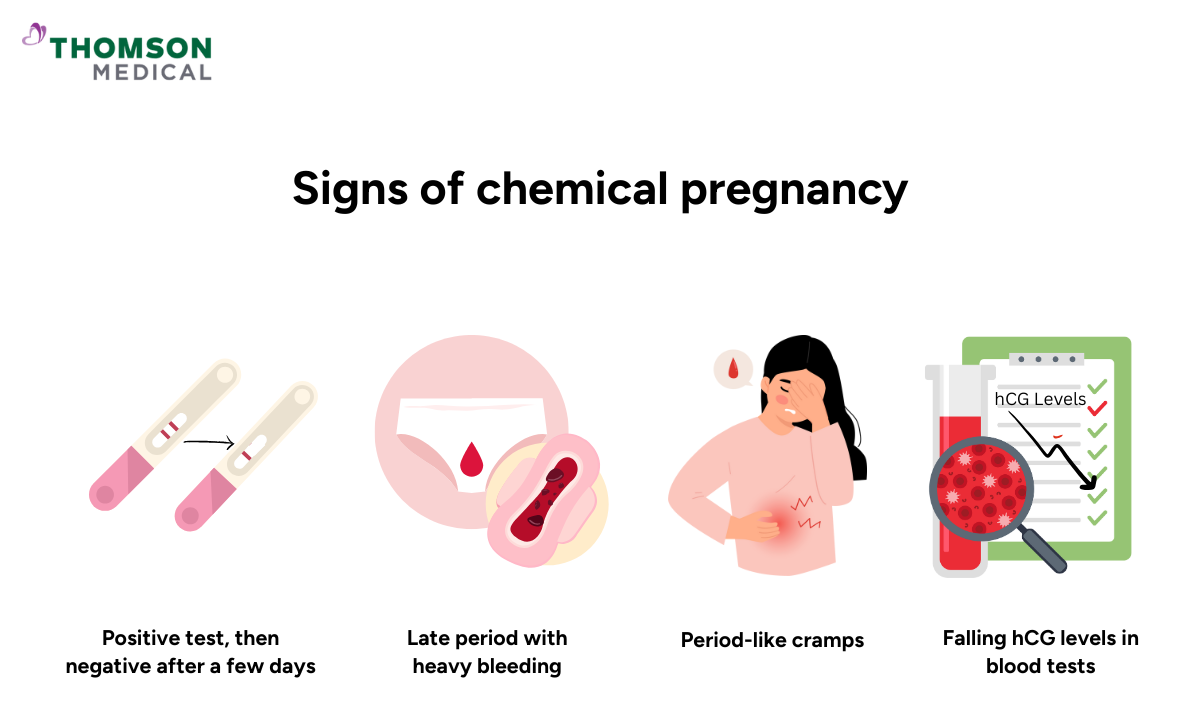Finding out you’re pregnant can be such an exciting moment. Seeing that ‘Pregnant’ word on a test feels like hope in your hands. But if it’s soon followed by bleeding or the test turns negative, your joyful moment can turn into a heartbreaking experience.
This early pregnancy loss is called a chemical pregnancy. Understanding why it happens, what signs to watch for, and what you can do to take care of yourself can make this confusing time a little easier.
What is a chemical pregnancy?

A chemical pregnancy is basically an early miscarriage, usually before the fifth week. Here’s what happens:
An embryo forms and may attach to the uterus
But development stops shortly after
Ultrasounds won’t show anything
It’s called a “chemical” or biochemical pregnancy because it’s only detectable with a test. Your body produces a hormone called hCG when an embryo implants. If the embryo stops developing, hCG drops and the test turns negative.
Why does a chemical pregnancy happen?
The most common reason is that something is off with the embryo’s chromosomes—basically, it just doesn’t develop properly. But there are other things that can play a role:
The embryo doesn’t implant quite right
Hormonal imbalances like low progesterone, PCOS, or thyroid issues
Uterine conditions like fibroids or polyps
Egg or sperm quality
Chronic health conditions
Lifestyle factors like smoking, alcohol, or stress
Who’s more likely to have one?
Anyone can experience a chemical pregnancy, but the risk may be higher if you match any of the following factors:
Being over the age of 35, when egg quality naturally declines
Hormonal or endocrine disorders
Irregularly shaped uterus or fibroids
Past fertility issues or early pregnancy losses
Chronic health conditions that affect hormones or blood flow
Are going through In Vitro Fertilisation (IVF) or other fertility treatments
Signs of chemical pregnancy

The signs are often like a late or heavier period, but there are a few differences to look for:
A positive pregnancy test that turns negative in a few days
Delayed period followed by heavier bleeding than usual
Cramping similar to a period
Blood tests showing hCG dropping quickly
Is it a miscarriage?
Yes, technically it’s an early miscarriage. It often happens so early that the pregnancy sac never shows up on an ultrasound. Some people don’t even realise they are pregnant unless they are tested early. While both involve pregnancy loss, there are important differences between chemical pregnancy and miscarriage in terms of timing, detection, and symptoms."
How quickly does hCG fall?
The drop in hCG happens fairly quickly, and it usually follows this pattern:
Drop by half every two days
For most people, hCG levels go back to normal within a week or two
Home pregnancy tests may still show faint positives for a few days
Diagnosis of biochemical pregnancy
Doctors usually figure it out when:
A positive test is followed by bleeding and a negative result
Blood tests show a rise and then a sudden drop in hCG
Ultrasound doesn’t show a gestational sac at the expected time
Chemical pregnancy vs. clinical pregnancy
These two terms are often confused, but they mean different things:
Chemical pregnancy: Only detectable via tests, no embryo visible
Clinical pregnancy: Embryo or sac is visible, often with a heartbeat by six or seven weeks
Do you need treatment?
Most people don’t. The body naturally passes the pregnancy tissue, and the bleeding often looks like a heavy period.
Can you prevent it?
Not really. However, you can improve your odds by taking steps to ensure that your body is as healthy as possible for implantation:
Treat any hormonal or thyroid issues
Keep chronic illnesses under control
Maintain a balanced diet and stay active
Avoid smoking and heavy drinking
Talk to a fertility specialist if this happens more than once
A chemical pregnancy is an early pregnancy loss, but support and guidance can make a difference in your emotional and physical recovery. Request an appointment with specialists to discuss next steps and personalised care.
Coping with a chemical pregnancy
Even though it’s early, it can still feel really emotional. There are ways to support yourself through it:
Allow yourself to grieve, even a little
Talk to your partner, friends, or a therapist
Join support groups, online or in person
Remember that one early miscarriage doesn’t reduce your chance of a healthy pregnancy in the future
Tips for trying again after chemical pregnancy
Most people can try again right away, though some prefer to wait for the next cycle. Tips:
Track ovulation to know fertile days
Keep a healthy weight and eat well
Take prenatal vitamins
Manage stress with gentle exercise or relaxation
Talk to a doctor if the pregnancy losses repeat or there are underlying health concerns
Our fertility specialists
Loading...
FAQ
How common is chemical pregnancy?
Very common, potentially accounting for around 50–75% of very early miscarriages. Many cases go unnoticed because the bleeding happens around the expected period and looks like a late or heavy period.
Can chemical pregnancy happen without bleeding?
Rarely, yes. Some people only notice light spotting. Without testing, it can easily go unnoticed.
How soon can you try again after a chemical pregnancy?
Fertility usually returns quickly. Some people conceive immediately; others wait a cycle or two. Emotional readiness matters just as much as physical recovery.
Are you more fertile after one chemical pregnancy?
Not necessarily, though ovulation can return within a couple of weeks. Experiences vary.
How long does a chemical pregnancy last?
Usually by week four or five, it’s over. Bleeding may last a few days, and a negative pregnancy test by week five usually means the pregnancy didn’t continue.
How can one tell the difference between implantation bleeding and a chemical pregnancy?
Implantation bleeding is light, happens 6–12 days after ovulation, and the test stays positive. Chemical pregnancy bleeding is often heavier, around your expected period, and the test turns negative. Knowing this can help tell early miscarriage apart from normal early pregnancy changes.
The information provided is intended for general guidance only and should not be considered medical advice. For personalised recommendations and tailored advice based on your unique situations, please consult a specialist at Thomson Medical. Request an appointment with Thomson Medical today.
For more information, contact us:
Thomson Specialists (Women's Health)
Thomson Women's Clinic (TWC)
- Novena:
6592 6686 (Call), 8611 8986 (WA) - Bukit Batok:
6569 0668 (Call), 8686 3525 (WA) - Choa Chu Kang:
6893 1227 (Call), 8282 1796 (WA) Jurong:
6262 8588 (Call), 6262 8588 (WA)- Katong (female doctor):
6970 2272 (Call), 8611 9020 (WA) - Punggol:
6243 6843 (Call), 8811 0328 (WA) - Sembawang: 6753 5228
- Sengkang: 6388 8125
- Serangoon (female doctor): 6382 3313
- Tampines: 6857 6266
- Tiong Bahru: 6276 1525
